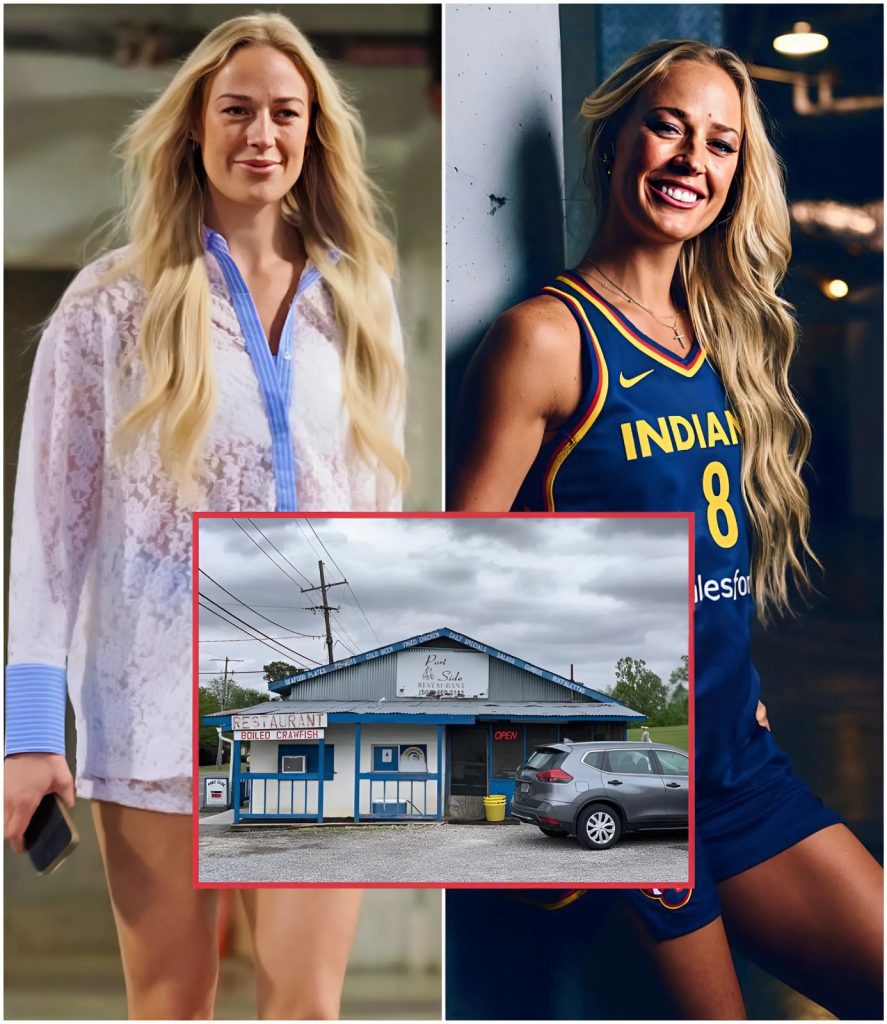HE FED HER FOR YEARS — THEN ONE DAY, SHE BOUGHT THE BUILDING.
The chairs were already stacked when she walked in.
It was early — 6:42 AM — and the “CLOSED” sign still hung crooked in the window. Most of the lights were off. The floor hadn’t been mopped from the night before. And there, behind the counter, the same man stood as he had for decades. Same apron. Same coffee stain on the collar. Same smile — though now slower, weighed down.
Charlie didn’t recognize her at first. She wore a plain sweatshirt. No makeup. Her hair tucked under a cap. She looked like every other stranger passing through Columbia, Missouri.
But Sophie wasn’t a stranger. Not here.
Fifteen years earlier, this was the place she’d come when her fridge was empty. When the heat had been cut off. When her mom was working double shifts and dinners were more of a hope than a plan.
Charlie’s Diner was never on any map. But to Sophie Cunningham, it was the safest place in the world.
And he never once let her pay.
“Just sit down,” he’d say. “You can eat. You’re home now.”
She did. Many times. Quietly. Thankfully.
Today, she didn’t sit. She stood near the counter, one hand tucked in her coat pocket, the other holding a small envelope.
Charlie greeted her like any customer.
“Morning,” he said. “You know we’re not open yet.”
“I know,” Sophie said, smiling softly. “This won’t take long.”
She stepped forward, placed the envelope on the counter, and pushed it toward him.
Charlie raised an eyebrow. “What’s this?”
“A receipt,” she replied. “For all the meals I never paid for.”
He chuckled, half-confused. “You don’t have to—”
But she wasn’t finished.
“And the building,” she added. “That’s yours too. Again.”
He froze.
“What do you mean?”
Sophie looked around the room, breathing it in — the cracked linoleum, the faded booths, the dusty clock that hadn’t worked since 2009.
“I bought the building, Charlie,” she said. “Last week. From your landlord. He was going to sell it to a developer. They were going to tear this place down. Turn it into condos.”
She paused.
“Not anymore.”
Charlie blinked. “You… what?”
“Look at the envelope.”
Inside was a cashier’s check for $87,000 — the exact amount the landlord had been asking. Attached was a signed deed, transferring ownership to Charlie Jenkins, effective immediately.
“No PR,” Sophie said. “No newspaper stories. No cameras. Just… this.”
Charlie’s hands trembled as he read the documents. Then he looked up — and saw something else.
Behind Sophie, hanging on the back wall of the diner, was a new wooden sign. It hadn’t been there yesterday.
The words were carved into it — no paint, no lights, just raw oak and deep grooves:
“Paid in full. For every meal. For every chance. For every time you said, ‘Stay as long as you need.’”
Charlie dropped the envelope.
He didn’t cry right away. He didn’t move. He just stood there, eyes locked on the sign, as if it had unlocked a part of his soul he hadn’t touched in years.
Then, quietly, he sat down.
And for the first time in a long time, he shook.
Sophie didn’t hug him. She didn’t say anything else. She just placed a hand on his shoulder, gave it a gentle squeeze, and walked out.
He didn’t see the tears in her eyes.
She never looked back.
That would’ve been the end of it — just one moment between two people, buried inside a diner that most people had forgotten.
Except someone else had seen the sign.
A college student, picking up part-time work cleaning the back kitchen, had taken a photo before opening hours. He posted it to TikTok with a simple caption:
“A girl saved the diner that fed her for free. She didn’t ask for a thank you. Just a sign.”
The video exploded.
Within 24 hours, it had 3.2 million views.
Within 48, the local news showed up, asking Charlie for a quote. He declined.
Within 72, reporters were parked outside his windows, asking “Is Sophie Cunningham the one who bought the place?”
He said nothing.
Sophie, for her part, ignored every email. Every DM. Every request for interview.
She didn’t want to trend. She just wanted to return something she never thought she could.
But the story had already left the diner. It was now in the bloodstream of the internet.
People from all over began sharing their own memories — of restaurants that let them eat when they had nothing, of quiet kindnesses from strangers behind counters, of debt that was never demanded but never forgotten.
One woman wrote: “I don’t want to repay it. I want to carry it forward.”
Another added: “Some meals fill your stomach. Some feed your whole future.”
Donations began arriving — not to Sophie, but to Charlie’s Diner. People paid for gift cards and left instructions: “Give this to someone who needs it.” Others showed up with notes: “For someone like Sophie.”
The walls of the diner became a living scrapbook of anonymous thanks.
Charlie never changed the sign.
He never added to it.
He just kept wiping the tables, brewing the same burnt coffee, and welcoming everyone with the same phrase:
“Sit down. You’re home now.”
But something had changed — something small, invisible, permanent.
A weight had lifted.
Because even if no one ever paid for a meal again, he knew one thing for certain:
What he’d done had come back around. In full.
It hadn’t come with headlines. It hadn’t come with confetti.
It came quietly. In sweatshirts and envelopes. In wood and silence.
In a moment when one girl remembered exactly what one man had done — and wrote it into the walls of time.
And to those who still ask what Sophie wrote on that sign…
The answer is simple.
She wrote everything. Without saying a word.
This article is a dramatized version of events inspired by real acts of quiet generosity. All characters and events have been fictionalized for narrative purposes.


